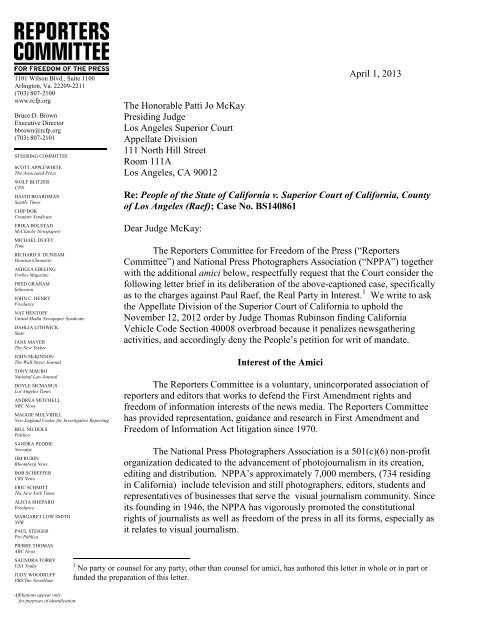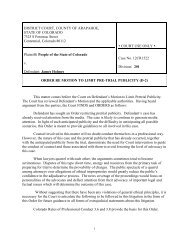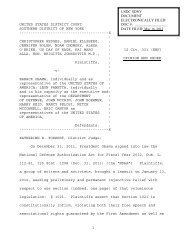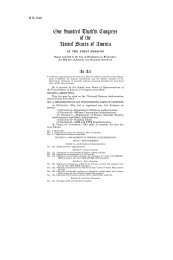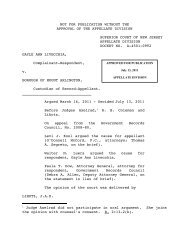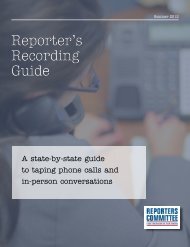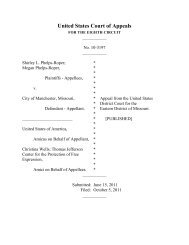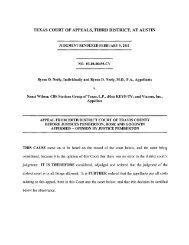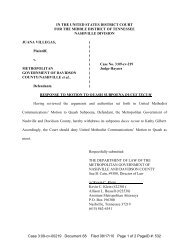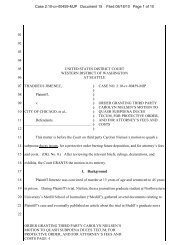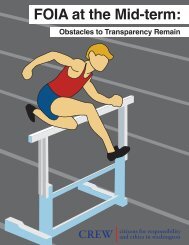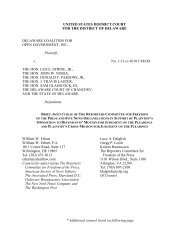April 1, 2013 The Honorable Patti Jo McKay Presiding Judge Los ...
April 1, 2013 The Honorable Patti Jo McKay Presiding Judge Los ...
April 1, 2013 The Honorable Patti Jo McKay Presiding Judge Los ...
You also want an ePaper? Increase the reach of your titles
YUMPU automatically turns print PDFs into web optimized ePapers that Google loves.
1101 Wilson Blvd., Suite 1100Arlington, Va. 22209-2211(703) 807-2100www.rcfp.orgBruce D. BrownExecutive Directorbbrown@rcfp.org(703) 807-2101STEERING COMMITTEESCOTT APPLEWHITE<strong>The</strong> Associated PressWOLF BLITZERCNNDAVID BOARDMANSeattle TimesCHIP BOKCreators SyndicateERIKA BOLSTADMcClatchy NewspapersMICHAEL DUFFYTimeRICHARD S. DUNHAMHouston ChronicleASHLEA EBELINGForbes MagazineFRED GRAHAMInSessionJOHN C. HENRYFreelanceNAT HENTOFFUnited Media Newspaper SyndicateDAHLIA LITHWICKSlateJANE MAYER<strong>The</strong> New YorkerJOHN McKINNON<strong>The</strong> Wall Street <strong>Jo</strong>urnalTONY MAURONational Law <strong>Jo</strong>urnalDOYLE MCMANUS<strong>Los</strong> Angeles TimesANDREA MITCHELLNBC NewsMAGGIE MULVIHILLNew England Center for Investigative ReportingBILL NICHOLSPoliticoSANDRA PEDDIENewsdayJIM RUBINBloomberg NewsBOB SCHIEFFERCBS NewsERIC SCHMITT<strong>The</strong> New York TimesALICIA SHEPARDFreelanceMARGARET LOW SMITHNPRPAUL STEIGERPro PublicaPIERRE THOMASABC NewsSAUNDRA TORRYUSA TodayJUDY WOODRUFFPBS/<strong>The</strong> NewsHour<strong>The</strong> <strong>Honorable</strong> <strong>Patti</strong> <strong>Jo</strong> <strong>McKay</strong><strong>Presiding</strong> <strong>Judge</strong><strong>Los</strong> Angeles Superior CourtAppellate Division111 North Hill StreetRoom 111A<strong>Los</strong> Angeles, CA 90012<strong>April</strong> 1, <strong>2013</strong>Re: People of the State of California v. Superior Court of California, Countyof <strong>Los</strong> Angeles (Raef); Case No. BS140861Dear <strong>Judge</strong> <strong>McKay</strong>:<strong>The</strong> Reporters Committee for Freedom of the Press (―ReportersCommittee‖) and National Press Photographers Association (―NPPA‖) togetherwith the additional amici below, respectfully request that the Court consider thefollowing letter brief in its deliberation of the above-captioned case, specificallyas to the charges against Paul Raef, the Real Party in Interest. 1 We write to askthe Appellate Division of the Superior Court of California to uphold theNovember 12, 2012 order by <strong>Judge</strong> Thomas Rubinson finding CaliforniaVehicle Code Section 40008 overbroad because it penalizes newsgatheringactivities, and accordingly deny the People‘s petition for writ of mandate.Interest of the Amici<strong>The</strong> Reporters Committee is a voluntary, unincorporated association ofreporters and editors that works to defend the First Amendment rights andfreedom of information interests of the news media. <strong>The</strong> Reporters Committeehas provided representation, guidance and research in First Amendment andFreedom of Information Act litigation since 1970.<strong>The</strong> National Press Photographers Association is a 501(c)(6) non-profitorganization dedicated to the advancement of photojournalism in its creation,editing and distribution. NPPA‘s approximately 7,000 members, (734 residingin California) include television and still photographers, editors, students andrepresentatives of businesses that serve the visual journalism community. Sinceits founding in 1946, the NPPA has vigorously promoted the constitutionalrights of journalists as well as freedom of the press in all its forms, especially asit relates to visual journalism.1 No party or counsel for any party, other than counsel for amici, has authored this letter in whole or in part orfunded the preparation of this letter.Affiliations appear onlyfor purposes of identification.
Letter of <strong>The</strong> Reporters Committee for Freedom of the Press andNational Press Photographers Association, <strong>April</strong> 1, <strong>2013</strong>Page 2<strong>The</strong> Association of Alternative Newsmedia (―AAN‖) is a diverse group of 125alternative news organizations covering every major metropolitan area and other lesspopulatedregions of North America. AAN member publications reach more than 50 millionactive, educated and influential adults in print, on the web and on mobile devices.<strong>The</strong> Associated Press Media Editors (―APME‖) is an association of editors atnewspapers, broadcast outlets and journalism educators and student leaders in the UnitedStates and Canada. APME works closely with <strong>The</strong> Associated Press to foster journalismexcellence and to support a national network for the training and development of editors whowill run multimedia newsrooms in the 21st Century. APME is a nonprofit, tax-exemptassociation under Section 501(c)(6) of the Internal Revenue Code. APME is on the front linein setting ethical and journalistic standards for newspapers and in the battle for freedom ofinformation and the First Amendment.<strong>The</strong> California Broadcasters Association (―CBA‖) is the trade organizationrepresenting the interests of the over 1000 radio and television stations in our state. <strong>The</strong>CBA advocates on state and federal legislative issues, provides seminars for membereducation and offers scholarship opportunities to students in the communication majors.Many of our stations have extensive news operations and CA Vehicle Code Section 40008puts them at legal risk each day for doing their jobs. This code section jeopardizes not onlynews reporters at our stations, but anyone who carries a camera, tape recorder, or other kindsof electronic equipment as a requirement of their employment.<strong>The</strong> California Newspaper Publishers Association (―CNPA‖) is a nonprofit tradeassociation representing the interests of nearly 850 daily, weekly and student newspapers.For over 130 years, CNPA has worked to protect and enhance the freedom of speechguaranteed to all citizens and to the press by the First Amendment of the United StatesConstitution and Article 1, Section 2 of the California Constitution. CNPA strongly opposedAB 2479 (Bass), the legislation that established the enhancements at issue in this matter.<strong>The</strong> E.W. Scripps Company owns 19 network affiliated television stations andSpanish language stations across the country, including ABC and Azteca affiliates in SanDiego and Bakersfield. Scripps also owns daily newspapers in 14 markets, includingVentura and Redding. <strong>The</strong> company also operates web operations to support all of itsnewspapers and television stations.<strong>The</strong> Society of Professional <strong>Jo</strong>urnalists (―SPJ‖) is dedicated to improving andprotecting journalism. It is the nation's largest and most broad-based journalism organization,dedicated to encouraging the free practice of journalism and stimulating high standards ofethical behavior. Founded in 1909 as Sigma Delta Chi, SPJ promotes the free flow ofinformation vital to a well-informed citizenry; works to inspire and educate the nextgeneration of journalists; and protects First Amendment guarantees of freedom of speech andpress.
Letter of <strong>The</strong> Reporters Committee for Freedom of the Press andNational Press Photographers Association, <strong>April</strong> 1, <strong>2013</strong>Page 3DISCUSSIONWe do not suggest here that the act of driving recklessly down California roadwaysitself should be considered a constitutionally protected newsgathering activity. Indeed, Mr.Raef himself did not contest the charges he received based on the state‘s reckless drivinglaws. Rather, amici urge the court to recognize Section 40008 for what it is: a duplicativelaw which establishes heightened penalties to photographers with the intent of capturingimages for commercial gain for the exact same conduct proscribed by other portions of thestate‘s vehicle code.<strong>The</strong> Petitioner‘s contention that Section 40008 does not implicate the FirstAmendment because it regulates the act of reckless driving but not the actual snapping of theimage or the content of the resulting photograph is, at best, disingenuous and runs contrary toestablished First Amendment jurisprudence. Newsgathering activities do not commence, asPetitioners would have this court to believe, at the moment a photographer snaps a shutter.Rather, oftentimes the process of gathering news includes the actions journalists take tophysically bring themselves in proximity to where events of public interest occur. Vehiclessuch as television news trucks are crucial tools of the trade for visual journalists. <strong>The</strong> law asit is written threatens to sweep into its grasp and subject to enhanced penalties not only themuch-maligned paparazzi photographers in pursuit of lucrative celebrity images, butmembers of the mainstream press traveling on assignment to the places where news happensand the visual-journalist en route to capture images of relevance to the community.Newsgathering is protected by the First AmendmentPetitioners make the point several times in their briefings with this court thatCalifornia Vehicle Code Section 40008 does not infringe on speech activities, and thereforedoes not implicate First Amendment interests. Rather, Petitioners claim the law simplyproscribes the conduct of reckless driving by photographers who have the intent to captureimages. Petitioners further make the claim that because the statute ―does not regulate spokenwords or patently expressive conduct, it does not fall within the ambit of the FirstAmendment.‖ (Petitioner‘s Reply brief, p. 2).<strong>The</strong> U.S. Supreme Court, however, makes clear that the First Amendment‘s guaranteeof press freedom is meaningless if journalists do not possess an attendant right to gather thenews. In Branzburg v. Hayes, the Court recognized that the First Amendment‘s protection ofa free press carries with it protection for essential newsgathering:We do not question the significance of free speech, press, or assembly to thecountry‘s welfare. Nor is it suggested that news gathering does not qualify forFirst Amendment protection; without some protection for seeking out thenews, freedom of the press could be eviscerated.408 U.S. 665, 681 (1972). Justice Stewart similarly wrote in dissent that ―[n]ews must not be
Letter of <strong>The</strong> Reporters Committee for Freedom of the Press andNational Press Photographers Association, <strong>April</strong> 1, <strong>2013</strong>Page 4unnecessarily cut off at its source, for without freedom to acquire information the right topublish would be impermissibly compromised.‖ Id. at 728 (Stewart, J., joined by Brennan,J., and Marshall, J., dissenting).In Texas v. <strong>Jo</strong>hnson, the Court made clear that the interests protected by the FirstAmendment were not limited to the written word: ―<strong>The</strong> First Amendment literally forbids theabridgment only of ‗speech,‘ but we have long recognized that its protection does not end atthe spoken or written word. … [W]e have acknowledged that conduct may be ‗sufficientlyimbued with elements of communication to fall within the scope of the first and FourteenthAmendments.‖ 491 U.S. 397, 404 (1989). Moreover, newsgathering is essential topreserving a free press and the free flow of information, as ―freedom of the press can be nobroader than the freedom of reporters to investigate and report the news.‖ See Department ofJustice Policy with Regard to the Issuance of Subpoenas to Members of the News Media, 28C.F.R. § 50.10 (1998).Section 40008 cannot be exempt from First Amendment protection, as Petitionersclaim. No statute exists outside the parameters of the Constitution. See Marcus v. SearchWarrants, 367 U.S. 717, 731 (1961) (holding that no state is ―free to adopt whateverprocedures it pleases for dealing with obscenity as here involved without regard to thepossible consequences for constitutionally protected speech.‖). Further, the U.S. SupremeCourt made clear the responsibility courts have in scrutinizing statutory provisions to ensurespeech-related conduct – such as the ability of journalists to gather the news – is notunconstitutionally burdened:A legislature appropriately inquires into and may declare the reasonsimpelling legislative action but the judicial function commands analysis ofwhether the specific conduct charged falls within the reach of the statute andif so whether the legislation is consonant with the Constitution. Were itotherwise, the scope of freedom of speech and the press would be subject tolegislative definition and the function of the First Amendment as a check onlegislative power would be nullified.Landmark Comm. Inc. v. Virginia, 435 U.S. 829, 844 (1978). Moreover, because anotherwise valid law can conflict with the First Amendment, the court must consider whetherit is overbroad as applied in a given situation. As the Court has stated:<strong>The</strong> objectionable quality of vagueness and overbreadth does not depend uponabsence of fair notice to a criminally accused or upon unchanneled delegationof legislative powers, but upon the danger of tolerating, in the area of FirstAmendment freedoms, the existence of a penal statute susceptible of sweepingand improper application.NAACP v. Button, 371 U.S. 415, 432-33 (1963). Application of Section 40008 to a journalistengaged in the constitutionally protected act of newsgathering demands careful balancing of
Letter of <strong>The</strong> Reporters Committee for Freedom of the Press andNational Press Photographers Association, <strong>April</strong> 1, <strong>2013</strong>Page 5competing interests because constitutional freedoms ―are delicate and vulnerable, as well assupremely precious in our society.‖ See Branzburg, 408 U.S. at 738 (quoting NAACP, 371U.S. at 433). ―Because First Amendment freedoms need breathing space to survive,government may regulate in the area only with narrow specificity‖ and must take care not toapply statutory provisions in a manner that violates constitutional rights. Button, 371 U.S. at433 (citations omitted). As such, courts considering punishments for exercise of the right togather news should weigh the public interest in obtaining information against competinginterests.<strong>The</strong> Petitioners offer a strained argument in support of their claims that no speechinterests are implicated through violation of Section 40008. In doing so, Petitioners attemptto cast the newsgathering activities of photographers as a ―peripheral effect on FirstAmendment activity‖ while analogizing their actions to California cases involving theactivities of drug dealers and prostitutes in pursuit of their illicit trades. (Petitioner‘s Replybrief, p. 3-4). Section 40008 differs from the state‘s other reckless driving laws in onesignificant respect – the statute singles out those engaged in an expressive activity, namely,the capturing of visual images or sound recordings, while the statutes in the cases cited byPetitioners single out criminal actions such as prostitution and drug-dealing.Photojournalists are often subject to intrusions on constitutionallyprotected newsgathering activities through criminal statutesAmici are concerned that should Section 40008 stand unchallenged, it could serve as atool by this state‘s law enforcement community to limit the actions of the mainstream pressand visual journalists attempting to report on matters of public concern, not just paparazzi.Photographers are never charged with the crime of ―photography,‖ but it is that activity thatbrings them to the attention of police officers who use a range of catch-all charges toprosecute. Indeed, cases throughout the country demonstrate how journalists often findthemselves in the crosshairs of overzealous law enforcement:In 2011, the American Civil Liberties Union of Southern California filed a lawsuitagainst the <strong>Los</strong> Angeles Sheriff‘s Department challenging the detention andharassment of photographers who were taking pictures in public places, stating, ―tosingle them out for such treatment while they‘re pursuing a constitutionally protectedactivity is doubly wrong.‖ <strong>The</strong> lawsuit was filed on behalf of three photographers,and the ACLU press release touting the suit noted ―[p]hotographers in <strong>Los</strong> Angelesand nationwide are increasingly subject to harassment by police officers. … Safetyand security concerns should not be used as a pretext to chill free speech andexpression or to impede the ability to gather news.‖ See Challenging Sheriff’sDept.’s Detention of Photographers, ACLU OF SOUTHERN CALIFORNIA, October 27,2011, http://www.aclu-sc.org/challenges-sheriffs-depts-detention-of-photographers.Freelance photojournalist Mannie Garcia was arrested by Montgomery County policewhile filming police activity on a public street in Wheaton, Maryland. Officers
Letter of <strong>The</strong> Reporters Committee for Freedom of the Press andNational Press Photographers Association, <strong>April</strong> 1, <strong>2013</strong>Page 6charged him with disorderly conduct. Mr. Garcia was acquitted after a bench trial.Unfortunately, because of those pending charges he was denied the renewal of hisWhite House Press credential and his ability to cover stories there. Mr. Garciacommenced a civil rights lawsuit against the county and the officers, and mostrecently, the United States Department of Justice filed a Statement of Interest on hisbehalf noting among other things ―that discretionary charges, such as disorderlyconduct, loitering, disturbing the peace, and resisting arrest, are all too easily used tocurtail expressive conduct or retaliate against individuals for exercising their FirstAmendment rights.‖ See Donald R. Winslow, Justice Department Statement SupportsMannie Garcia's Federal Civil Rights Lawsuit, NATIONAL PRESS PHOTOGRAPHERSASSOCIATION, March 4, <strong>2013</strong>, https://www.nppa.org/node/42647.Freelance journalist Phil Datz was arrested by Suffolk County police in Long Island,New York, while attempting to record a police investigation. Mr. Datz was standingon a public street when a sergeant approached him while repeatedly yelling at him to―go away, go away now.‖ When Datz asked where he should go, he was told that heneeded to leave the area or face arrest. When he attempted to videotape police frommore than a block away, Datz was arrested. <strong>The</strong> charge was later dropped afterletters objecting to the arrest were sent to the police department and the story waspublicized. Datz then filed a lawsuit claiming his civil rights had been violated. SeeClara Hogan, Photojournalist arrested after filming police on public street,REPORTERS COMMITTEE FOR FREEDOM OF THE PRESS, Aug. 2, 2011,http://www.rcfp.org/browse-media-law-resources/news/photojournalist-arrested-afterfilming-police-public-street;see also Steve Myers, Photojournalist sues cop, SuffolkCounty, N.Y., over right to videotape police, POYNTER,http://www.poynter.org/latest-news/mediawire/169671/photojournalist-sues-copsuffolk-county-n-y-over-right-to-film-police.Jim Epstein and Peter Tucker, both online journalists, were arrested and removedfrom a public meeting of the Washington D.C. Taxicab Commission. Both werecharged with disorderly conduct and ―unlawful entry/remaining‖ by U.S. Park Policeafter refusing to stop photographing and recording the meeting which was held atPark Police headquarters in order to better accommodate the large number of taxicabdrivers who were there to voice their opposition to a change in licensing rules. <strong>The</strong>attorney general dismissed the charges almost immediately after the actions werewidely criticized in the press. See Mark Segraves, <strong>Jo</strong>urnalists won’t face charges,WJLA-TV, June 24, 2011, http://www.wjla.com/articles/2011/06/journalists-won-tface-charges-62814.html.Milwaukee <strong>Jo</strong>urnal Sentinel photojournalist Kristyna Wentz-Graff was arrested whiletaking pictures of an Occupy Wall Street protest. <strong>The</strong> officers making the arrestclaimed they were unaware Ms. Wentz-Graff was a journalist even though video ofthe incident showed that she was prominently displaying her press credential. SeeKaren Herzog, JS photographer arrested while covering Occupy Milwaukee protest,
Letter of <strong>The</strong> Reporters Committee for Freedom of the Press andNational Press Photographers Association, <strong>April</strong> 1, <strong>2013</strong>Page 7MILWAUKEE JOURNAL SENTINEL, Nov. 2, 2011,http://www.jsonline.com/news/milwaukee/js-photographer-arrested-while-coveringoccupy-milwaukee-protest-133090133.html.A student photojournalist covering an ―Occupy‖ demonstration in Rochester, NewYork, was arrested for trespassing and violation of a municipal code that prohibitsbeing in the public park after hours after the journalist refused to leave the park,which, according to police, was closed at the time. <strong>The</strong> judge ultimately dismissedthe charges. <strong>The</strong> People of the State of New York v. Acuff et al., No. CR011-343597(Rochester City Ct. Monroe County Jan. 12, 2012).Emily Good was arrested by police in Rochester, New York for videotaping a trafficstop from the front lawn of her home. She was charged with obstructinggovernmental administration, but the charge was dropped by prosecutors within daysafter her story received national attention. See Jesse Solomon, Charge dismissedagainst woman who videotaped police encounter, CNN, June 27, 2011,http://www.cnn.com/2011/CRIME/06/27/new.york.police.video/index.html?_s=PM:CRIME.Unfortunately, some infringements on newsgathering activity are only resolved afterprotracted litigation. In at least two federal appellate circuits, courts affirmed theconstitutional protections afforded to newsgathering. In Glik v. Cuniffe, the U.S. Court ofAppeals for the First Circuit affirmed the rights of citizens to record police officers carryingout their duties in public spaces. 655 F.3d 78 (1st Cir. 2011). In 2007, Simon Glik wasarrested under the Massachusetts wiretapping law for openly recording with his cell phonewhat he believed to be an unlawful arrest on the Boston Common. In affirming Glik‘s FirstAmendment rights to record police in public, the Court noted in its analysis the ―selfevident‖First Amendment right to gather news is, as the Court has often noted, not one thatinures solely to the benefit of the news media; rather, the public‘s right of access toinformation is coextensive with that of the press and extends beyond the prohibition againstgovernmental abridgment of freedom of speech to ―encompasses a range of conduct relatedto the gathering and dissemination of information.‖ Id. at 82-83. ―<strong>The</strong>re is an undoubtedright to gather news from any source by means within the law.‖ Id. (internal citations andquotations omitted).Similarly in ACLU v. Alvarez, the Seventh Circuit barred enforcement of the IllinoisEavesdropping Act against the American Civil Liberties Union of Illinois. 679 F.3d 583 (7thCir. 2012). In doing so, that court also recognized the importance of constitutionallyprotecting newsgathering activity:In short, the eavesdropping statute restricts a medium of expression—the useof a common instrument of communication—and thus an integral step in thespeech process. As applied here, it interferes with the gathering and
Letter of <strong>The</strong> Reporters Committee for Freedom of the Press andNational Press Photographers Association, <strong>April</strong> 1, <strong>2013</strong>Page 8Id. at 600.dissemination of information about government officials performing theirduties in public. Any way you look at it, the eavesdropping statute burdensspeech and press rights and is subject to heightened First Amendmentscrutiny.For the foregoing reasons, we respectfully urge the Court to allow the trial courtdecision to stand and to deny the People‘s petition for writ of mandate.Very truly yours,Bruce D. BrownGregg P. LeslieJack S. KomperdaFor <strong>The</strong> Reporters Committeefor Freedom of the PressMickey H. OsterreicherFor the National Press PhotographersAssociationJean-Paul Jassy (Cal. Bar No. 205513)Bostwick & Jassy LLP12400 Wilshire Blvd., Suite 400<strong>Los</strong> Angeles, CA 90025Tel: (310) 979-6059Counsel for Amici Curiae
PROOF OF SERVICEIN THE APPELLATE DIVISION OF THE LOS ANGELESSUPERIOR COURTPEOPLE V. SUPERIOR COURT (RAEF)App. Div. Case No. BS140861At the time of service, I was over 18 years of age and not a party to the abovereferencedaction. I am employed in the County of <strong>Los</strong> Angeles, State of California. Mybusiness address is 12400 Wilshire Boulevard, Suite 400, <strong>Los</strong> Angeles, California 90025.On <strong>April</strong> 1, <strong>2013</strong>, I served true copies of the following document(s) described asAMICI LETTER BRIEF IN SUPPORT OF PAUL RAEF on the interested parties in thisaction as follows:SEE ATTACHED SERVICE LISTBY MAIL: I enclosed the document(s) in a sealed envelope or package addressedto the persons at the addresses listed in the Service List and placed the envelope forcollection and mailing, following our ordinary business practices at 12400 WilshireBoulevard, Suite 400, <strong>Los</strong> Angeles, California 90025. I am readily familiar withBostwick & Jassy LLP practice for collecting and processing correspondence for mailing.On the same day that the correspondence is placed for collection and mailing, it isdeposited in the ordinary course of business with the United States Postal Service, in asealed envelope with postage fully prepaid.I declare under penalty of perjury under the laws of the State of California that theforegoing is true and correct.Executed on <strong>April</strong> 1, <strong>2013</strong>, at <strong>Los</strong> Angeles, California.Marianne Poff
SERVICE LIST<strong>The</strong> People v. Superior Court (Raef)Case No. BS140861Carmen A. Trutanich, City AttorneyDebbie Lew, Assistant City AttorneyKatharine H. MacKenzie,Deputy City AttorneyCRIMINAL APPELLATE DIVISION500 City Hall East200 North Main Street<strong>Los</strong> Angeles, California 90012Tel: (213) 473-6900Fax: (213) 978-8779Barry R. Levy (BAR No. 53977)Jeremy B. Rosen (BAR No. 192473)Mark A. Kressel (BAR No. 254933)HORVITZ & LEVY LLP15760 VENTURA BOULEVARD, 18TH FLOOREncino, California 91436-3000(818) 995-0800 • FAX: (818) 995-3157blevy@horvitzlevy.comjrosen@horvitzlevy.cornmkressel@horvitzlevy.comDavid S. Kestenbaum (BAR NO. 85228)Dmitry Gorin (BAR NO. 178353)Brad Kaiserman (BAR NO. 266220)KESTENBAUM, EISNER &GORIN, LLP14401 Sylvan Street, Suite 112VAN Nuys, California 91401(818) 781-1570 • FAX: (818) 781-5033brad@keglawyers.comAttorneys for Petitioner,PEOPLE OF THE STATE OFCALIFORNIAAttorneys for Real Party In Interest,PAUL RAEFAttorneys for Real Party In Interest,PAUL RAEF<strong>Honorable</strong> Thomas Rubinson<strong>Judge</strong> of the Superior CourtVan Nuys Courthouse, Dept. 11314400 Erwin Street MallVan Nuys, California 91401


